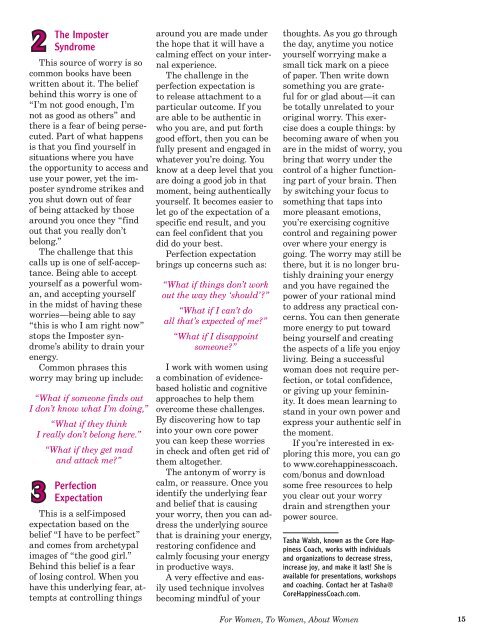Make the World a Better Place Neva Gould Graceful Aging Worry Is ...
Make the World a Better Place Neva Gould Graceful Aging Worry Is ...
Make the World a Better Place Neva Gould Graceful Aging Worry Is ...
- No tags were found...
You also want an ePaper? Increase the reach of your titles
YUMPU automatically turns print PDFs into web optimized ePapers that Google loves.
2The ImposterSyndromeThis source of worry is socommon books have beenwritten about it. The beliefbehind this worry is one of“I’m not good enough, I’mnot as good as o<strong>the</strong>rs” and<strong>the</strong>re is a fear of being persecuted.Part of what happensis that you find yourself insituations where you have<strong>the</strong> opportunity to access anduse your power, yet <strong>the</strong> impostersyndrome strikes andyou shut down out of fearof being attacked by thosearound you once <strong>the</strong>y “findout that you really don’tbelong.”The challenge that thiscalls up is one of self-acceptance.Being able to acceptyourself as a powerful woman,and accepting yourselfin <strong>the</strong> midst of having <strong>the</strong>seworries—being able to say“this is who I am right now”stops <strong>the</strong> Imposter syndrome’sability to drain yourenergy.Common phrases thisworry may bring up include:“What if someone finds outI don’t know what I’m doing,”“What if <strong>the</strong>y thinkI really don’t belong here.”“What if <strong>the</strong>y get madand attack me?”3 PerfectionExpectationThis is a self-imposedexpectation based on <strong>the</strong>belief “I have to be perfect”and comes from archetypalimages of “<strong>the</strong> good girl.”Behind this belief is a fearof losing control. When youhave this underlying fear, attemptsat controlling thingsaround you are made under<strong>the</strong> hope that it will have acalming effect on your internalexperience.The challenge in <strong>the</strong>perfection expectation isto release attachment to aparticular outcome. If youare able to be au<strong>the</strong>ntic inwho you are, and put forthgood effort, <strong>the</strong>n you can befully present and engaged inwhatever you’re doing. Youknow at a deep level that youare doing a good job in thatmoment, being au<strong>the</strong>nticallyyourself. It becomes easier tolet go of <strong>the</strong> expectation of aspecific end result, and youcan feel confident that youdid do your best.Perfection expectationbrings up concerns such as:“What if things don’t workout <strong>the</strong> way <strong>the</strong>y ‘should’?”“What if I can’t doall that’s expected of me?”“What if I disappointsomeone?”I work with women usinga combination of evidencebasedholistic and cognitiveapproaches to help <strong>the</strong>movercome <strong>the</strong>se challenges.By discovering how to tapinto your own core poweryou can keep <strong>the</strong>se worriesin check and often get rid of<strong>the</strong>m altoge<strong>the</strong>r.The antonym of worry iscalm, or reassure. Once youidentify <strong>the</strong> underlying fearand belief that is causingyour worry, <strong>the</strong>n you can address<strong>the</strong> underlying sourcethat is draining your energy,restoring confidence andcalmly focusing your energyin productive ways.A very effective and easilyused technique involvesbecoming mindful of yourthoughts. As you go through<strong>the</strong> day, anytime you noticeyourself worrying make asmall tick mark on a pieceof paper. Then write downsomething you are gratefulfor or glad about—it canbe totally unrelated to youroriginal worry. This exercisedoes a couple things: bybecoming aware of when youare in <strong>the</strong> midst of worry, youbring that worry under <strong>the</strong>control of a higher functioningpart of your brain. Thenby switching your focus tosomething that taps intomore pleasant emotions,you’re exercising cognitivecontrol and regaining powerover where your energy isgoing. The worry may still be<strong>the</strong>re, but it is no longer brutishlydraining your energyand you have regained <strong>the</strong>power of your rational mindto address any practical concerns.You can <strong>the</strong>n generatemore energy to put towardbeing yourself and creating<strong>the</strong> aspects of a life you enjoyliving. Being a successfulwoman does not require perfection,or total confidence,or giving up your femininity.It does mean learning tostand in your own power andexpress your au<strong>the</strong>ntic self in<strong>the</strong> moment.If you’re interested in exploringthis more, you can goto www.corehappinesscoach.com/bonus and downloadsome free resources to helpyou clear out your worrydrain and streng<strong>the</strong>n yourpower source.Tasha Walsh, known as <strong>the</strong> Core HappinessCoach, works with individualsand organizations to decrease stress,increase joy, and make it last! She isavailable for presentations, workshopsand coaching. Contact her at Tasha@CoreHappinessCoach.com.For Women, To Women, About Women15




